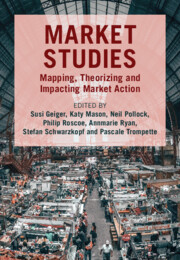Book contents
- Market Studies
- Market Studies
- Copyright page
- Contents
- Figures
- Tables
- Contributors
- Acknowledgements
- Introduction: The Multiple Pasts, Presents and Futures of Markets and Market Studies
- Part I Market Designs and Market Misfires
- Chapter 1 Tinkering in Markets for Collective Goods: Experiments, Exceptionalities and the Case of HIV Medications
- Chapter 2 Market Engineering: A New Problem for Market Studies?
- Chapter 3 Disentangling Marketization from Assetization? The Case of the Market for Social Investments
- Chapter 4 Factishing a Market
- Chapter 5 The Dynamics of Ongoing Market Maintenance through Centralized Market Work
- Part II Post-Performative Approaches to Studying Markets
- Part III Valuation
- Part IV Markets in Motion: Places and Spaces
- Part V The Secret Life of Market Studies Methods
- Part VI Broadening the Perspectives in Market Studies
- Part VII Future (Im)Perfect Markets
- Index
- References
Chapter 2 - Market Engineering: A New Problem for Market Studies?
from Part I - Market Designs and Market Misfires
Published online by Cambridge University Press: 22 November 2024
- Market Studies
- Market Studies
- Copyright page
- Contents
- Figures
- Tables
- Contributors
- Acknowledgements
- Introduction: The Multiple Pasts, Presents and Futures of Markets and Market Studies
- Part I Market Designs and Market Misfires
- Chapter 1 Tinkering in Markets for Collective Goods: Experiments, Exceptionalities and the Case of HIV Medications
- Chapter 2 Market Engineering: A New Problem for Market Studies?
- Chapter 3 Disentangling Marketization from Assetization? The Case of the Market for Social Investments
- Chapter 4 Factishing a Market
- Chapter 5 The Dynamics of Ongoing Market Maintenance through Centralized Market Work
- Part II Post-Performative Approaches to Studying Markets
- Part III Valuation
- Part IV Markets in Motion: Places and Spaces
- Part V The Secret Life of Market Studies Methods
- Part VI Broadening the Perspectives in Market Studies
- Part VII Future (Im)Perfect Markets
- Index
- References
Summary
This chapter is intended as a conversation piece aimed at our fellow Market Studies scholars. The goal is to bring to the fore some of the possibilities and challenges of activities usually grouped under the term market design cause to our field. The argument unfolds in four steps. First, we draw on resources from economic history, economics, and Market Studies that, although in different ways, emphasize engineering in relation to economics and markets. We mobilize them to show how engineering rather than the looser notion of design provides a more precise and productive conceptual starting point for studying the work of market designers. Second, drawing on previous work by the authors, we provide two empirical illustrations of market engineering in action. Third, we combine the conceptual and empirical antecedents to delimit what we mean by the concept of market engineering. Fourth, we explore how market engineering is not only a relatively new problem of analysis for Market Studies scholars, but also challenges central conceptual and analytical habits that characterize research in this community.
- Type
- Chapter
- Information
- Market StudiesMapping, Theorizing and Impacting Market Action, pp. 38 - 50Publisher: Cambridge University PressPrint publication year: 2024

